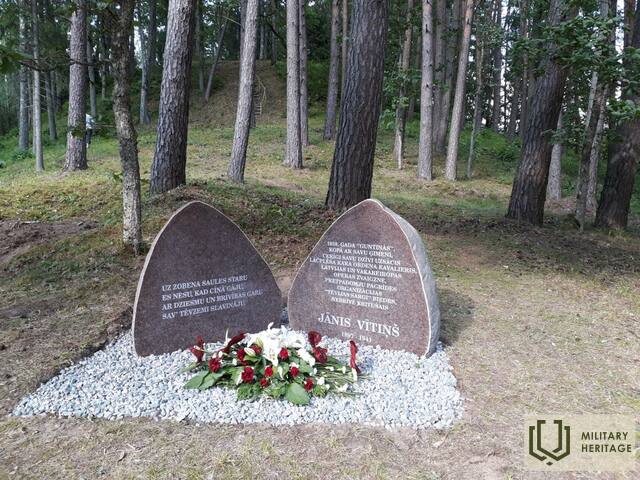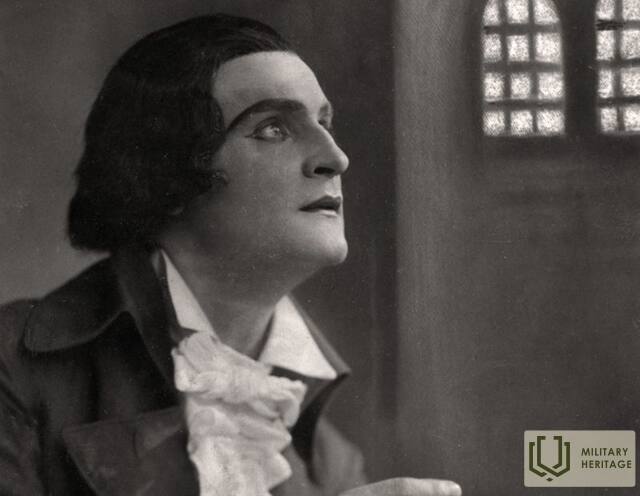Memorial to Jānis Vītiņš Memorial site

 97
97



Jānis Vītiņš (1894-1941) was not only a great singer, but also a heroic soldier. For his heroism in the battles near Bolderaja in 1921, Jānis Vītiņš was awarded the Lāčplēsis War Order.
The Spārni hillfort, together with the house “Guntiņas”, was presented to J. Vītiņš by the Latvian state in the 1930s for his heroic deeds in the Latvian freedom struggle. A memorial was unveiled on June 21, 2019 in Īle, at the foot of the Spārni hillfort.
The memorial stone was created under the guidance of sculptor Iveta Smiltniece and symbolically reflects Jānis Vītiņš's contribution to Latvia:
"It is a boulder cut in half, with one side depicting Jānis Vītiņš's military exploits, and the other side depicting his achievements in opera music."
"Jānis Vītiņš was born on 14.10.1894 in Pullā, Dzērve parish, today Cīrava parish. Died: 29.11.1941 in Astrakhan, Russian Soviet Federative Socialist Republic, KPFSR. Sentenced to death by firing squad in Astrakhan prison.
J. Vītiņš was born into the family of a farmer Fričis, where three other children grew up – Kārlis, Matilde, Bille (Betija). He studied at Rāva Elementary School, Činka Commercial School in Liepāja, and entered the Pskov Ensign School. In his marriage to Erna, in 1922, his son Gunārs (Gunards) was born.
In 1915, during the First World War, J. Vītiņš was mobilized into the Russian army. He served in the 9th Ural Infantry Regiment, from 1917 - in the 2nd Separate Heavy Artillery Division. During the War of Independence, in 1919, J. Vītiņš was mobilized into the Latvian Army, served with the rank of senior lieutenant. J. Vītiņš was an organizer and trainer of the National Guard (from 02.1919), later served in the Newly Formed Forces and a separate battalion. During his service years, J. Vītiņš began singing in front of the public, joining a vocal quartet.
When the Latvian People's Council was established in Liepāja, J. Vītiņš became a member of it in the Social Democratic faction. In the summer of 1919, he was assigned as a formator of the Riga Newly Formed Forces volunteer company and later appointed as the first commander of such a company. He was also the chief of the military police, then transferred to the 8th Daugavpils Infantry Regiment. During the Bermontiades, J. Vītiņš was wounded in battles on the Jelgava highway.
In 1920, after demobilization, J. Vītiņš entered the Latvian Conservatory, studied singing (with Ernests Witting), sang in the National Opera Choir at the same time, and was soon entrusted with small roles. His debut was the role of Wilhelm in Ambroise Thomas's opera "Mignon". In 1929, he was hired by the Zagreb Opera House (Yugoslavia). During his career, tenor J. Vītiņš performed 36 opera roles, most of them in the 1930s, when he was in demand in opera houses in many European cities. From 1931 to 1937, the singer, under the stage name Jan Wittin, performed in Germany - at the Berlin Volksoper, Dessau, Leipzig, Cologne, Duisburg, Stettin, Breslau, Essen, as well as in Czechoslovakia, Yugoslavia, Switzerland, and the Netherlands.
In 1940, under the conditions of the Soviet occupation, J. Vītiņš became involved in the resistance movement “Guardians of the Fatherland”. On 06.03.1941. J. Vītiņš was arrested at his place of residence in Riga, on Baložu Street, falsely accused of spying for Germany. On 15.03. in accordance with Article 58. 1-a of the Criminal Code of the Communist Party of the Soviet Union “for treason to the homeland”, the singer was sentenced to the highest penalty by the Stalingrad garrison military tribunal. The death sentence was carried out on 29 (12?) November 1941 in Astrakhan prison. J. Vītiņš’s widow and son were repressed (deported).
In 2018, the memory of the outstanding tenor and patriot was honored with the performance of the opera “André Chenier” at the Sigulda Opera Music Festival. J. Vītiņš's name is inscribed on a memorial stele, which was unveiled on 11.11.2018. in Aizpute Misiņkalns Park. In 2019, a memorial sign was unveiled at J. Vītiņš's house at the foot of the Spārni castle mound in Īle parish. At the Latvian National Opera and Ballet House, J. Vītiņš's name is written on a chair in the 14th row, in the 1st place."
National Encyclopedia, author Daiga azvērsīte.
Used sources and references:
https://www.youtube.com/watch?v=qkRiqXFC3R0
https://visitdobele.lv/pieminekli-pieminas-vietas1/pieminas-vieta-janim-vitinam#
https://enciklopedija.lv/skirklis/110785
https://www.delfi.lv/kultura/174/music/50239853/dziedat-dzert-un-karot-neparspejamais-varontenors-janis-vitins
https://www.la.lv/pedeja-arija-pirms-navessoda-krievijas-cietuma









